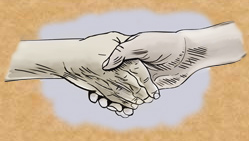In a village somewhere in old Africa, there was a tradition: When a young man reached the age of manhood, he was to follow the ways of his father. That meant he was to marry, learn to farm, and feed his family and the elderly of the village. It was also the custom for the young man to appear before the village chief at this time. After much celebration, he would be given six chickens, two goats, and two sacks of seeds, so that he might begin a life of his own.
On one such occasion, two young childhood friends, one named Kinta and the other Bunga, came before the chief. After receiving their gifts, each went their separate ways. Kinta set up his farm in the hills to the west of the village, and Bunga to the east.
Before long, the villagers were talking about Kinta and his success. He was not only feeding his family and giving to the elderly of the village, but also trading his surplus of animals and food to other villages, to get the many different foods and animals that his village did not have.
However, his childhood friend Bunga was not doing well. Bunga was somewhat lazy and wasted his time dreaming that better things would come his way. Of course, they never did, and he had to return to the village looking for help. When he heard how successful his friend Kinta had become, he traveled to visit him. On Kinta’s farm Bunga saw many people working in the fields and many healthy animals and fruit trees.
He turned to his friend and said, “Kinta, you have so much and I have so little. Would you help me?”
“Of course I will help you. What would you like from me?” asked Kinta.
Bunga replied, “I would like anything you are willing to give.”
“Did you say anything?” asked Kinta.
“Yes, anything,” replied Bunga.
“Very well,” said Kinta, “How would you like to have everything I have?”
Bunga’s eyes opened wide at such an offer. “Of course, I would. But how could I repay you?”
“I will decide someday when you can afford to repay me,” replied Kinta.
Bunga then turned his head and looked out over the farm. “You mean you are giving me all of this?”
“No,” said Kinta, “all of this is not yours, but what I am going to give you can bring you as much as I have, and maybe more.”
He then gave his friend Bunga six chickens, two goats, and two sacks of seeds.
Bunga was surprised by the gift and didn’t know what to say. But then he realized that he was being given a second chance to better his life. He also realized how lucky he was to have such a true friend. He thanked his friend Kinta, took the animals and seeds, and returned to his land. He carefully planted his seeds and tended to his animals with all the love and care he could give.
The years passed. Bunga became quite successful at running his farm. He soon had everything his friend Kinta had. Then one day, he decided to visit his friend and repay him for his help.
“Thanks to you Kinta, I now have the success you have. What can I pay you for being so helpful?”
Kinta replied, “I did not help you in order to make a profit. I helped you because you are my friend.”
“But,” said Bunga, “you said you would decide what I owed you when I succeeded.”
“Yes, that is correct,” said Kinta, “and you can now repay me by giving me six chickens, two goats, and two sacks of seeds.”
There are five morals to this story: (1) to have a friend, you must be a friend; (2) things that come easily are often not appreciated; (3) do not waste time, for that is what life is made of; (4) no act of kindness, no matter how small, is ever wasted; and (5) everyone of worth deserves a second chance.




